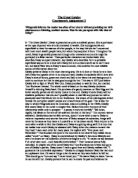“Ultimately, Gatsby’s dream is defeated by nothing more nor less than Time itself.”
How far and in what ways do you agree with this view of the Great Gatsby?
F.Scott Fitzgerald have set up in his novel “The Great Gatsby” the different views of how “ultimately, Gatsby’s dream is defeated by nothing more nor less than Time itself.”, such as Gatsby’s inability to diffrentiate between reality and illusion and his build-up of unrealistic dreams. However, there are also other ways in which his dream can be defeated, other than time itself. The significance and importance of the presence of time as well as other significant factors are both heightened by Fitzgerald’s skillful use of range of key techniques such as symbolism, metaphors, foreshadowing, characterisation to effectively convey the extension of my agreement towards whether or not Gatsby’s dream is defeated by time.
Fitzgerald uses Gatsby’s inability to distinguish between reality and illusion to speak of the defeat of his dream through Gatsby’s ideal persona and through the act of his house as a metaphor. Gatsby’s downfall seems to be result of his inablity to see through and beyond illusions- especially when “he sprang from his platonic conception of himself.” We can see that it’s the attempt itself and the firm belief that he can achieve the impossible that is more than the sum of his reality. Gatsby conforms to the ideal of himself that can transform reality to possibility. Therefore, using this to his advantage Gatsby ha crafted Daisy into the ideal woman that he wishes her to be. Fitzgerald writes: "There must have been moments even that afternoon when Daisy tumbled short of his dreams--not through her own fault, but because of the colossal vitality of his illusion." As a reader, we can all recognise that Daisy is only a regular, rich western girl. However, because Gatsby has made her more perfect than she actually is in his imagination,this suggests that the “colossal vitality of his illusions” of Gatsby, the idealized version of himself is what thrown him into the idea that Daisy is perfect. By doing this, I think that Fiztgerald intends to critisize how people in the 1920s blindly giving meaning to the idealism of the American Dream, as much as Gatsby is trying to give as much perfection to his own love, Daisy. Furthermore, another idea of illusion present in Gatsby is his “failure, incoherent of a house.” By describing his house as a failure and by using the word “incoherent”, the mansion is suggestive of the measure of failure of the democratic ideals. For many years, Gatsby presented his house with demoractic ordeals to enhance his aristocratic image and wealth. Therefore by doing this, Gatsby has hidden away traces of himself which further deepens his illusions and driven him to live in it, as much as his house is an unrealistic object he uses to only impress Daisy. Thus, I do agree that Gatsby is driven by his illusions to an extent that when he faces with reality when Daisy leaves him, he realizes that his dream is gone forever.








